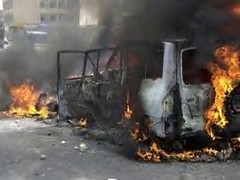
Blackwater, USA contractors attacked in Fallujah, Iraq during 2004
Originally uploaded by panafnewswire
U.S. Lawyers Knew About Legal Pitfalls in Blackwater Case
By MATTHEW L. WALD
New York Times
WASHINGTON — The sudden blow to the case against the former Blackwater security guards over a shooting that killed 17 Iraqis and wounded at least 20 may have come as a surprise to the public in Iraq and the United States, but the legal problem that the judge cited Thursday when he threw out the indictments was obvious to American government lawyers within days of the shooting.
The issue was that the guards, as government contractors, were obligated to give an immediate report of what they had done, but the Constitution prevents the government from requiring a defendant to testify against himself, so those statements could not be used in a prosecution.
Less than two weeks after the shootings in Nisour Square in Baghdad in September 2007, lawyers at the State Department, which employed the guards, expressed concern that prosecutors might be improperly using the compulsory reports in preparing a criminal case against them, according to the decision.
The prosecutors were also concerned, even using what they called a “taint team” to try to prevent information in the guards’ compulsory statements from influencing the investigation, according to the 90-page ruling by Judge Ricardo M. Urbina of Federal District Court in Washington. The judge said the prosecutors had failed to take “common sense precautions” to avoid the problem.
The ruling led to disappointment in the United States as well as in Iraq.
“It is regrettable that the prosecutors didn’t have the foresight to be able to deal with this problem before the judge had to deal with it for them,” said Vincent Warren, the executive director of the Center for Constitutional Rights, a group based in New York that is bringing a civil suit against Blackwater, now named Xe Services, on behalf of the families of the dead and wounded.
Mr. Warren said Friday that he had not yet had time to read the decision, but that for the victims “it sends the wrong message to them about the seriousness with which this government is taking measures of accountability.”
A Justice Department spokesman, Dean Boyd, said Friday that his agency was “considering our options,” but would not comment further.
Judge Urbina’s decision would make it difficult for prosecutors to reinstate the original charges. Information that the guards were required to give immediately after the shootings was deeply woven into the government’s effort to secure the indictments, he wrote.
Winning a new indictment would require the government to prove it was not relying even indirectly on that information, the ruling said. Sometimes the government demonstrates that there is no contamination of the information used to an obtain an indictment by having it “canned,” or preserved, in a memorandum completed and dated before the prosecutors are exposed to suspects’ compulsory statements, but that was not done in this case, the judge said.
But the judge’s decision alludes to at least two routes through which the government could reinstate a prosecution.
Although the specifics of the guards’ statements cannot be used against them, the guards could be prosecuted for willfully providing false information in those statements.
In statements, the guards gave detailed information about what kinds of weapons they had used, including a sniper rifle and a grenade, and said they had believed that they were under attack and that they were taking small-arms fire. Investigators did not find physical evidence of an attack by Iraqis, the judge’s decision said.
The decision also points out that at one point, the government considered bringing obstruction of justice charges against Blackwater managers. It is not clear whether such charges are still being considered.
The rules limiting the use of the statements, the judge noted, are not intended to protect defendants from conviction, but to guarantee the integrity of the judicial system.
Soon after the government first sought indictments by bringing the case to a grand jury, in late November 2007, prosecutors decided that they had already erred by presenting the jurors with information that came from the off-limits statements.
So they took the case to a second grand jury, a year later, and used transcripts from the witness testimony at the first grand jury, with the tainted information removed.
But in their presentations to the second grand jury, the prosecutors also edited out evidence that suggested that the guards were firing in self-defense, the judge said, and those omissions were improper.
And the evidence presented to the second grand jury was still tainted by the initial statements, Judge Urbina said. Among the ways the guards’ inadmissible statements ended up in prosecutors’ hands was through television and newspaper reports that quoted from them, the judge said.
In a separate case, federal prosecutors in North Carolina, where the company is based, are investigating whether executives engaged in a broad array of criminal activities, including weapons smuggling, money laundering and tax evasion, according to lawyers and others familiar with the inquiry.
No comments:
Post a Comment